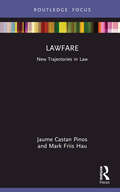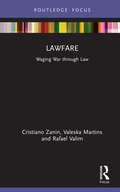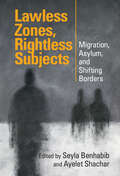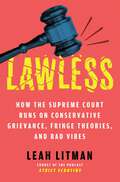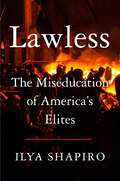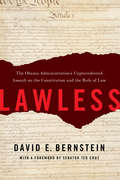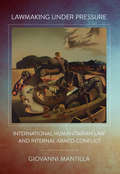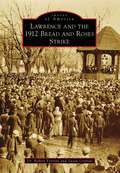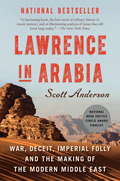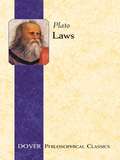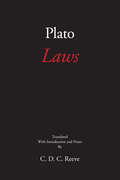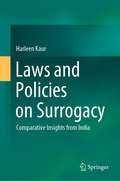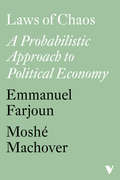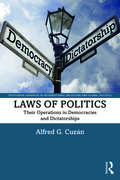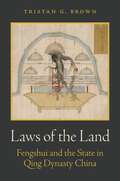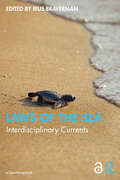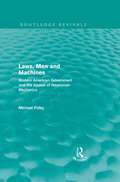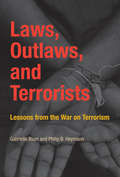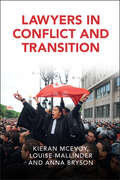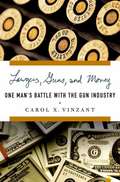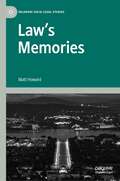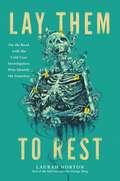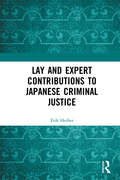- Table View
- List View
Lawfare: New Trajectories in Law (New Trajectories in Law)
by Jaume Castan Pinos Mark Friis HauThis book develops a new conceptualisation of lawfare that recognises the polysemantic nature of the term. Drawing on theoretical developments from legal anthropology, international relations, and social theory, the book scrutinises the multiple dimensions of this phenomenon. It illustrates the multifaceted character of lawfare with a wide range of historical and contemporary cases from across the globe and analyses the implications of actors pursuing political objectives through legal means. This includes the use of lawfare by states as a legal instrument to accomplish geopolitical objectives, domestic lawfare, or the use of legal instruments to undermine internal opposition, and state lawfare used by governments to ‘protect’ the state from internal territorial-secessionist challenges. Finally, the book shows that lawfare is not exclusively a tool for hegemonic actors, as it can also be used by civil society actors that aim to uphold their rights through legal instruments in asymmetric lawfare. This book contributes to new developments in lawfare without shying away from controversy, acknowledging its sometimes-brutal efficacy as well as its potential pitfalls. The book will appeal to scholars and students of law, international relations, political science, anthropology, and sociology.
Lawfare: Waging War through Law
by Cristiano Zanin Martins Valeska Teixeira Martins Rafael ValimThis book examines one of the most emblematic cases of lawfare today: the criminal prosecution of former Brazilian President Lula. The authors argue that lawfare is not just a slogan or a game at the service of any one political ideology. Rather, it has to do with a complex, multifaceted phenomenon that should be carefully reflected upon in modern constitutional democracies, given that it is able to demolish majority rule and the rule of law. They contend it is the strategic use of the law with the purpose of delegitimizing, harming or annihilating an enemy. The literature specializing in the subject tends to alternate between analysis of only one aspect of the phenomenon or consists of extensive case studies. In order to fill this gap, this book revisits the subject and offers a sophisticated theoretical approach to lawfare, in an unprecedented combination of theory of war and theory of law. The book will be of interest to students, researchers and policy makers working in the areas of public law, international law, procedural law, anthropology of law and sociology of law, as well as political science and international relations.
Lawless Zones, Rightless Subjects: Migration, Asylum, and Shifting Borders
by Seyla Benhabib Ayelet ShacharResponding to ever-increasing pressures of migration, states, supranational, and subnational actors deploy complex moves and maneuvers to reconfigure borders, rights, and territory, giving rise to a changing legal cartography of international relations and international law. The purpose of this volume is to study this new reconfiguration of rights, territoriality, and jurisdiction at the empirical and normative levels and to examine its implications for the future of democratic governance within and across borders. Written by a diverse and accomplished group of scholars, the chapters in this volume employ legal, historical, philosophical, critical, discursive, and postcolonial perspectives to explore how the territoriality of the modern states – ostensibly, the most stable and unquestionable element undergirding the current international system – has been rewritten and dramatically reimagined. This title is also available as Open Access on Cambridge Core.
Lawless: How the Supreme Court Runs on Conservative Grievance, Fringe Theories, and Bad Vibes
by Leah LitmanAn instant New York Times bestseller! NATIONAL BESTSELLER Something is deeply rotten at the Supreme Court. How did we get here and what can we do about it? Crooked Media podcast host Leah Litman shines a light on the unabashed lawlessness embraced by conservative Supreme Court justices and shows us how to fight back. With the gravitas of Joan Biskupic and the irreverence of Elie Mystal, Leah Litman brings her signature wit to the question of what&’s gone wrong at One First Street. In Lawless, she argues that the Supreme Court is no longer practicing law; it&’s running on vibes. By &“vibes,&” Litman means legal-ish claims that repackage the politics of conservative grievance and dress them up in robes. Major decisions adopt the language and posture of the law, while in fact displaying a commitment to protecting a single minority: the religious conservatives and Republican officials whose views are no longer shared by a majority of the country. Dahlia Lithwick&’s Lady Justice meets Rebecca Traister&’s Good and Mad as Litman employs pop culture references and the latest decisions to deliver a funny, zeitgeisty, pulls-no-punches cri de coeur undergirded by impeccable scholarship. She gives us the tools we need to understand the law, the dynamics of courts, and the stakes of this current moment—even as she makes us chuckle on every page and emerge empowered to fight for a better future.
Lawless: The Miseducation of America's Elites
by Ilya ShapiroIn the past, Columbia Law School produced leaders like Franklin Delano Roosevelt and Ruth Bader Ginsburg. Now it produces window-smashing activists.When protestors at Columbia broke into a building and created illegal encampments, the student-led Columbia Law Review demanded that finals be canceled because of “distress.”Law schools used to teach students how to think critically, advance logical arguments, and respect opponents. Now those students cannot tolerate disagreement and reject the validity of the law itself. Rioting Ivy Leaguers are the same people who will soon:Be America’s judges, DAs, and prosecutorsFile and fight constitutional lawsuitsAdvise Fortune 500 companiesHire other left-wing diversity candidates to staff law firms and government officesRun for higher office with an agenda of only enforcing laws that suit left-wing whimsIn Lawless, Ilya Shapiro explains how we got here and what we can do about it. The problem is bigger than radical students and biased faculty—it’s institutional weakness. Shapiro met the mob firsthand when he posted a controversial tweet that led to calls for his firing from Georgetown Law. A four-month investigation eventually cleared him on a technicality but declared that if he offended anyone in the future, he’d create a “hostile educational environment” and be subject to the inquisition again. Unable to do the job he was hired for, he resigned.This cannot continue. In Lawless, Shapiro reveals how the illiberal takeover of legal education is transforming our country. Unless we stop it now, the consequences will be with us for decades.
Lawless: The Obama Administration's Unprecedented Assault on the Constitution and the Rule of Law
by David E. Bernstein a Foreword by Senator Ted CruzLawless documents how President Barack Obama has presided over one constitutional debacle after another—Obamacare; unauthorized wars in the Middle East; attempts to strip property owners, college students, religious groups, and conservative political activists of their rights; and many more. <P><P> Violating his own promises to respect the Constitution’s separation of powers, Obama brazenly ignores Congress when it won’t rubber-stamp his initiatives. “We can’t wait,” he intones when amending Obamacare on the fly or signing a memo legalizing millions of illegal immigrants, as if Congress doing its job as a coequal branch of government somehow permits the president to rule like a dictator, free from the Constitution’s checks and balances. <P> President Obama has also presided over the bold and rampant lawlessness of his underlings. Harry Truman famously said, “The buck stops here.” When confronted with allegations that his administration’s actions are illegal, Obama responds, “So sue me.”
Lawmaking under Pressure: International Humanitarian Law and Internal Armed Conflict
by Giovanni MantillaIn Lawmaking under Pressure, Giovanni Mantilla analyzes the origins and development of the international humanitarian treaty rules that now exist to regulate internal armed conflict. Until well into the twentieth century, states allowed atrocious violence as an acceptable product of internal conflict. Why have states created international laws to control internal armed conflict? Why did states compromise their national security by accepting these international humanitarian constraints? Why did they create these rules at improbable moments, as European empires cracked, freedom fighters emerged, and fears of communist rebellion spread? Mantilla explores the global politics and diplomatic dynamics that led to the creation of such laws in 1949 and in the 1970s.By the 1949 Diplomatic Conference that revised the Geneva Conventions, most countries supported legislation committing states and rebels to humane principles of wartime behavior and to the avoidance of abhorrent atrocities, including torture and the murder of non-combatants. However, for decades, states had long refused to codify similar regulations concerning violence within their own borders. Diplomatic conferences in Geneva twice channeled humanitarian attitudes alongside Cold War and decolonization politics, even compelling reluctant European empires Britain and France to accept them. Lawmaking under Pressure documents the tense politics behind the making of humanitarian laws that have become touchstones of the contemporary international normative order.Mantilla not only explains the pressures that resulted in constraints on national sovereignty but also uncovers the fascinating international politics of shame, status, and hypocrisy that helped to produce the humanitarian rules now governing internal conflict.
Lawrence and the 1912 Bread and Roses Strike
by Susan Grabski Robert ForrantIncorporated in 1847 on the banks of the Merrimack River, Lawrence, Massachusetts, was the final and most ambitious of New England's planned textile-manufacturing cities developed by the Boston-area entrepreneurs who helped launch the American Industrial Revolution. With a dam and canal system to generate power, by 1912 Lawrence led the world in the production of worsted wool cloth. The Pacific Cotton Mills alone had sales of nearly $10 million and had mechanical equipment capable of producing 800 miles of finished textile fabrics every working day. However, industrial growth was accompanied by worsening health, housing, and working conditions for most of the city's workers. These were the root causes that led to the long, sometimes violent struggle between people of diverse ethnic groups and languages and the city's mill owners and overseers. The 1912 strike--known today as the Bread and Roses Strike--became a landmark moment in history.
Lawrence in Arabia: War, Deceit, Imperial Folly and the Making of the Modern Middle East
by Scott AndersonNATIONAL BESTSELLER • A New York Times Notable Book • Finalist for the National Book Critics Circle Award in Biography • A thrilling and revelatory narrative of one of the most epic and consequential periods in 20th century history – the Arab Revolt and the secret &“great game&” to control the Middle East&“A fascinating book, the best work of military history in recent memory and an illuminating analysis of issues that still loom large today."—The New York Times"Brilliant. . . . A dazzling accomplishment that combines superb historical research with a compelling narrative.&”—The Seattle TimesThe Arab Revolt against the Turks in World War I was, in the words of T. E. Lawrence, &“a sideshow of a sideshow.&” As a result, the conflict was shaped to a remarkable degree by a small handful of adventurers and low-level officers far removed from the corridors of power.At the center of it all was Lawrence himself. In early 1914 he was an archaeologist excavating ruins in Syria; by 1917 he was riding into legend at the head of an Arab army as he fought a rearguard action against his own government and its imperial ambitions. Based on four years of intensive primary document research, Lawrence in Arabia definitively overturns received wisdom on how the modern Middle East was formed.One of the Best Books of the Year: NPR, The Christian Science Monitor, The Seattle Times , St. Louis Post-Dispatch , Chicago Tribune
Laws
by Plato Benjamin JowettA lively dialogue between a foreign philosopher and a powerful statesman, Plato's Laws reflects the essence of the philosopher's reasoning on political theory and practice. It also embodies his mature and more practical ideas about a utopian republic. Plato's discourse ranges from everyday issues of criminal and matrimonial law to wider considerations involving the existence of the gods, the nature of the soul, and the problem of evil. This translation of Plato's Laws by the distinguished scholar Benjamin Jowett is an authoritative choice for students of philosophy, political science, and literature. It is included among Dover Publications' Philosophical Classics, a series that comprises the major works of ancient and modern world philosophy. Low-priced, high-quality, and unabridged, these editions are ideal for teachers and students as well as for general readers.
Laws (Hackett Classics)
by Plato"This is a superb new translation that is remarkably accurate to Plato's very difficult Greek, yet clear and highly readable. The notes are more helpful than those in any other available translation of the Laws since they contain both the information needed by the beginning student as well as analytical notes that include references to the secondary literature for the more advanced reader. For either the beginner or the scholar, this should be the preferred translation."—Christopher Bobonich, Clarence Irving Lewis Professor of Philosophy, Stanford University
Laws and Policies on Surrogacy: Comparative Insights from India
by Harleen KaurThis book is an essential guide on surrogacy, discussing various legal issues that arise in surrogacy cases. It provides a comprehensive coverage to various issues pertaining to surrogacy arrangements due to failure to meet the needs of those involved in surrogacy, be it the intended parents or the surrogate mother, with special emphasis on the most vulnerable party -- the surrogate child. In the wake of this existing imbalance, the call to reform the practice of surrogacy has also increased. The book provides a comprehensive coverage to various laws and policy regulations in existence dealing with surrogacy, and unravels the latest trends and developments happening around the world as surrogacy gains importance. The international perspectives highlight policies and practices being adopted and followed by various nations with regard to surrogacy regulation and associated parenthood rules. This book also analyses some of the significant cross-border disputes revolving around surrogacy, and explores briefly the jurisprudence of the European Court of Human Rights on matters of parentage and citizenship for children born of trans-national surrogacy with special reference to the prospects of a convention on international surrogacy currently being studied by The Hague Conference on Private International Law. Further, it highlights the issues and questions relating to surrogacy arrangements that are so far unresolved and unanswered and suggests measures for improvements to the existing proposed surrogacy legislation in India and need for uniform international regulation. The book is a great resource for legal practitioners, academics, students, policy-makers, infertility clinics, and charitable organizations working on this issue.
Laws of Chaos: A Probabilistic Approach To Political Economy
by Moshé Machover Emmanuel FarjounClassic work of political economicsA defining work of Econophysics, and republished for the first time since 1983, Laws of Chaos is an attempt to construct a non-deterministic theoretical framework for the foundations of political economy. It relies on probabilistic and statistical methods of the kind used in the modern foundations of several other sciences, introducing scientific modelling into economics for the first time.
Laws of Politics: Their Operations in Democracies and Dictatorships (Routledge Advances in International Relations and Global Politics)
by Alfred G. CuzánDrawing on classic and contemporary scholarship and empirical analysis of elections and public expenditures in 80 countries, the author argues for the existence of primary and secondary laws of politics. Starting with how basic elements of politics—leadership, organization, ideology, resources, and force—coalesce in the formation of states, he proceeds to examine the operations of those laws in democracies and dictatorships. Primary laws constrain the support that incumbents draw from the electorate, limiting their time in office. They operate unimpeded in democracies. Secondary laws describe the general tendency of the state to expand vis-à-vis economy and society. They exert their greatest force in one-party states imbued with a totalitarian ideology. The author establishes the primary laws in a rigorous analysis of 1,100 parliamentary and presidential elections in 80 countries, plus another 1,000 U.S. gubernatorial elections. Evidence for the secondary laws is drawn from public expenditure data series, with findings presented in easily grasped tables and graphs. Having established these laws quantitatively, the author uses Cuba as a case study, adding qualitative analysis and a practical application to propose a constitutional framework for a future Cuban democracy. Written in an engaging, jargon-free style, this enlightening book will be of great interest to students and scholars in political science, especially those specializing in comparative politics, as well as opinion leaders and engaged citizens.
Laws of the Land: Fengshui and the State in Qing Dynasty China
by Tristan G. BrownA groundbreaking history of fengshui’s roles in public life and law during China’s last imperial dynastyToday the term fengshui, which literally means “wind and water,” is recognized around the world. Yet few know exactly what it means, let alone its fascinating history. In Laws of the Land, Tristan Brown tells the story of the important roles—especially legal ones—played by fengshui in Chinese society during China’s last imperial dynasty, the Manchu Qing (1644–1912).Employing archives from Mainland China and Taiwan that have only recently become available, this is the first book to document fengshui’s invocations in Chinese law during the Qing dynasty. Facing a growing population, dwindling natural resources, and an overburdened rural government, judicial administrators across China grappled with disputes and petitions about fengshui in their efforts to sustain forestry, farming, mining, and city planning. Laws of the Land offers a radically new interpretation of these legal arrangements: they worked. An intelligent, considered, and sustained engagement with fengshui on the ground helped the imperial state keep the peace and maintain its legitimacy, especially during the increasingly turbulent decades of the nineteenth century. As the century came to an end, contentious debates over industrialization swept across the bureaucracy, with fengshui invoked by officials and scholars opposed to the establishment of railways, telegraphs, and foreign-owned mines.Demonstrating that the only way to understand those debates and their profound stakes is to grasp fengshui’s longstanding roles in Chinese public life, Laws of the Land rethinks key issues in the history of Chinese law, politics, science, religion, and economics.
Laws of the Sea: Interdisciplinary Currents
by Irus BravermanLaws of the Sea assembles scholars from law, geography, anthropology, and environmental humanities to consider the possibilities of a critical ocean approach in legal studies. Unlike the United Nations’ monumental Convention on the Law of the Sea, which imagines one comprehensive constitutional framework for governing the ocean, Laws of the Sea approaches oceanic law in plural and dynamic ways. Critically engaging contemporary concerns about the fate of the ocean, the collection’s twelve chapters range from hydrothermal vents through the continental shelf and marine genetic resources to coastal communities in France, Sweden, Florida, and Indonesia. Documenting the longstanding binary of land and sea, the chapters pose a fundamental challenge to European law’s “terracentrism” and its pervasive influence on juridical modes of knowing and making the world. Together, the chapters ask: is contemporary Eurocentric law—and international law in particular—capable of moving away from its capitalist and colonial legacies, established through myriad oceanic abstractions and classifications, toward more amphibious legalities? Laws of the Sea will appeal to legal scholars, geographers, anthropologists, cultural and political theorists, as well as scholars in the environmental humanities, political ecology, ocean studies, and animal studies.
Laws, Men and Machines: Modern American Government and the Appeal of Newtonian Mechanics (Routledge Revivals)
by Michael FoleyFirst published in 1990, Laws, Men and Machines is an original interpretation of the lasting influence that Newtonian mechanics has had on the design and operation of the American political system. The author argues that it is this mechanistic tradition that now instinctively shapes the way we conceive of, analyse, and evaluate American politics, and that the Newtonian conception of the world still finds expression in the 'checks and balances' of the American system.
Laws, Outlaws, and Terrorists: Lessons from the War on Terrorism (Belfer Center Studies in International Security)
by Gabriella Blum Philip B. HeymannGuidance for maintaining national security without abandoning the rule of law and our democratic values.In an age of global terrorism, can the pursuit of security be reconciled with liberal democratic values and legal principles? During its “global war on terrorism,” the Bush administration argued that the United States was in a new kind of conflict, one in which peacetime domestic law was irrelevant and international law inapplicable. From 2001 to 2009, the United States thus waged war on terrorism in a “no-law zone.”In Laws, Outlaws, and Terrorists, Gabriella Blum and Philip Heymann reject the argument that traditional American values embodied in domestic and international law can be ignored in any sustainable effort to keep the United States safe from terrorism. They demonstrate that the costs are great and the benefits slight from separating security and the rule of law. They call for reasoned judgment instead of a wholesale abandonment of American values. They also argue that being open to negotiations and seeking to win the moral support of the communities from which the terrorists emerge are noncoercive strategies that must be included in any future efforts to reduce terrorism.
Lawyering for the Rule of Law
by Yoav DotanLawyering for the Rule of Law introduces a new model of government lawyering in which government lawyers function as an ancillary mechanism that enables the court to expand its influence on policy-making within the political branches by forming out-of-court settlements. It discusses the centrality of government lawyers with regard to judicial mobilization and the enforcement of social reforms through adjudication, and sheds light on particular functions of government lawyers as adjudicators and facilitators of institutional arrangements. It also discusses the ethical and professional dilemmas of government lawyers in judicial review and the relationship between lawyers' professional morality and outcomes in litigation.
Lawyers in Conflict and Transition (Cambridge Studies in Law and Society)
by Anna Bryson Kieran McEvoy Louise MallinderCountries undergoing or recovering from conflict and authoritarianism often face profound rule of law challenges. The law on the statute books may be repressive, judicial independence may be compromised, and criminal justice agencies may be captured by powerful interests. How do lawyers working within such settings imagine the law? How do they understand their ethical obligations towards their clients and the rule of law? What factors motivate them to use their legal practice and social capital to challenge repressive power? What challenges and risks can they face if they do so? And when do lawyers facilitate or acquiesce to illegality and injustice? Drawing on over 130 interviews from Cambodia, Chile, Israel, Palestine, South Africa, and Tunisia, this book explores the extent to which theoretical understandings within law and society research on the motivations, strategies, tactics, and experiences of lawyers within democratic states apply to these more challenging environments.
Lawyers, Guns, and Money
by Carol X. VinzantThis inspiring book, Lawyers, Guns, and Money by Carol X. Vinzant, recounts the heroic efforts of Tom McDermott, a lawyer and victim of the infamous Colin Ferguson rampage on the Long Island Railroad, to take on the gun industry. He is among the leaders of an innovative and promising strategy to circumvent the NRA's political power and courts constrained by interpretations of the Second Amendment. Through civil action he hits the gun companies where it hurts most: the bottom line. Making insurance difficult for manufacturers to get, he has helped reduce the number of cheap hand guns, "Saturday Night Specials," often used in crime. This is a riveting account of tragedy turned into action, and how the law can be used to defend victims rather than enrich corporations.
Law’s Ethical, Global and Theoretical Contexts
by Christopher Mccrudden Baxi, Upendra and McCrudden, Christopher and Paliwala, Abdul Upendra Baxi Abdul PaliwalaLaw's Ethical, Global and Theoretical Contexts examines William Twining's principal contributions to law and jurisprudence in the context of three issues which will receive significant scholarly attention over the coming decades. Part I explores human rights, including torture, the role of evidence in human rights cases, the emerging discourse on 'traditional values', the relevance of 'Southern voices' to human rights debates, and the relationship between human rights and peace agreements. Part II assesses the impact of globalization through the lenses of sociology and comparative constitutionalism, and features an analysis of the development of pluralistic ideas of law in the context of privatization. Finally, Part III addresses issues of legal theory, including whether global legal pluralism needs a concept of law, the importance of context in legal interpretation, the effect of increasing digitalization on legal theory, and the utility of feminist and postmodern approaches to globalization and legal theory.
Law’s Memories (Palgrave Socio-Legal Studies)
by Matt HowardThis book discusses the relationship between law and memory and explores the ways in which memory can be thought of as contributing to legal socialization and legal meaning-making. Against a backdrop of critical legal pluralism which examines the distributedness of law(s), this book introduces the notion of mnemonic legality. It emphasises memory as a resource of law rather than an object of law, on the basis of how it substantiates senses of belonging and comes to frame inclusions and exclusions from a national community on the basis of linear-trajectory and growth narratives of nationhood. Overall, it explores the sensorial and affective foundations of law, implicating memory and perceptions of belonging within this process of creating legality and legitimacy. By identifying how memory comes to shape and inform notions of law, it contributes to legal consciousness research and to important questions informing much socio-legal research.
Lay Them to Rest: On the Road with the Cold Case Investigators Who Identify the Nameless
by Laurah NortonTake a fascinating deep dive into the dark world of forensic science as experts team up to solve the identity of an unknown woman by exploring the rapidly evolving techniques being used to break the most notorious cold cases. Fans of true crime shows like CSI, NCIS, Criminal Minds, and Law and Order know that when it comes to &“getting the bad guy&” behind bars, your best chance of success boils down to the strength of your evidence—and the forensic science used to obtain it. Beyond the silver screen, forensic science has been used for decades to help solve even the most tough-to-crack cases. In 2018, the accused Golden State Killer, Joseph DeAngelo, was finally apprehended after a decades-long investigation thanks to a very recent technique called forensic genealogy, which has since led to the closure of hundreds of cold cases, bringing long-awaited justice to victims and families alike. But when it comes to solving these incredibly difficult cases, forensic genealogy is just the tip of the iceberg—and many readers have no idea just how far down that iceberg goes. For Laurah Norton, forensic science was always more of a passion than anything else. But after learning about a mishandled 1990s cold case involving missing twins, she was spurred to action, eventually creating a massively popular podcast and building a platform that helped bring widespread attention and resources to the case. LAY THEM TO REST builds on Laurah&’s fascination with these investigations, introducing readers to the history and evolution of forensic science, from the death masks used in Ancient Rome to the 3-D facial reconstruction technology used today. Incorporating the stories of real-life John & Jane Does from around the world, Laurah also examines how changing identification methods have helped solve the most iconic cold cases. Along the way readers will also get to see Laurah solve a case in real time with forensic anthropologist Dr. Amy Michael, as they try to determine the identity of &“Ina&” Jane Doe, a woman whose head was found in a brush in an Illinois park in 1993. More than just a chronicle of the history of forensics, LAY THEM TO REST is also a celebration of the growing field of experts, forensic artists, and anthropologists (many of whom Laurah talks to in the book), who work tirelessly to bring closure to these unsolved cases. And of course, this book asks why some cases go unsolved, highlighting the &“missing missing,&” the sex workers, undocumented, the cases that so desperately need our attention, but so rarely get it. Engrossing, informative, heartbreaking, and hopeful, LAY THEM TO REST is a deep dive into the world of forensic science, showing readers how far we&’ve come in cracking cases and catching killers, and illuminating just how far we have yet to go.
Lay and Expert Contributions to Japanese Criminal Justice: Legal Outsiders
by Erik HerberThis book examines the little or not previously researched roles and contributions of non-legal professionals in Japanese criminal justice against the background of recent social and legal changes that either gave birth to or affected the roles played by these "outsiders". On the basis of a wealth of primary and secondary sources, including meeting records of policy makers and practitioners, surveys, interviews and court verdicts, the book zooms in on forensic psychiatrists’ role in the disappearance of criminally insane defendants from Japanese criminal courts; social workers’ new role in diverting a growing number of elderly, mentally disturbed repeat offenders from prison; the therapeutic dimension added to Japanese criminal justice proceedings with the introduction of a system of victim participation as well as the increasingly important role of forensic scientists’ contributions, notably DNA evidence, in Japanese courts. Finally, it examines lay judges’ contributions to sentencing practices as well as how these lay judges make sense of the other outsiders’ contributions. On the basis of very recent social and legal developments the book provides an original contribution to understandings of Japanese criminal justice, as well as more general socio-legal debates on the role of extra-legal knowledge in criminal justice. The book will be of value within BA and MA level courses on and to students and researchers of Japanese law and society as well as comparative criminal justice and socio-legal theory.
